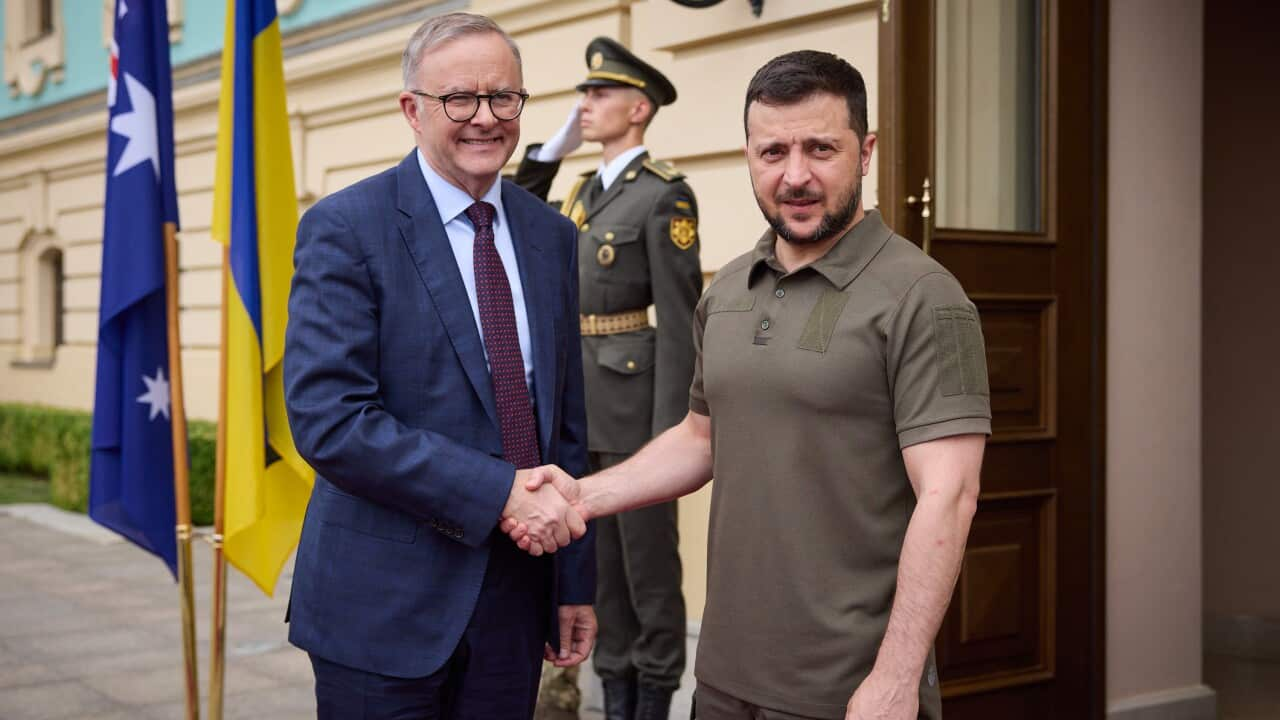Heavy Russian strikes hit the southern Ukrainian port city of Mykolaiv on Sunday, killing the owner of one of the country's largest grain producing and exporting companies, the local governor said.
Oleksiy Vadatursky, founder and owner of agriculture company Nibulon and his wife, were killed in their home, Mykolaiv Governor Vitaliy Kim said on Telegram.
Headquartered in Mykolaiv, a strategically important city that borders the mostly Russia-occupied Kherson region, Nibulon specialises in the production and export of wheat, barley and corn, and it has its own fleet and shipyard.
President Volodymyr Zelenskyy described Mr Vadatursky's death as "a great loss for all of Ukraine", saying the businessman had been in the process of building a modern grain market involving a network of transshipment terminals and elevators.
Three people were also wounded in the attacks on Mykolaiv, the city's Mayor Oleksandr Senkevych told Ukrainian television, adding 12 missiles had hit homes and educational facilities. He earlier described the strikes as "probably the most powerful" on the city of the entire five-month-old war.
Up to 50 Grad rockets hit residential areas in the southern city of Nikopol on Sunday morning, Dnipropetrovsk Governor Valentyn Reznichenko wrote on Telegram. One person was wounded.
Ukrainian forces hit Russia's Black Sea Fleet headquarters in Russian-held Sevastopol early on Sunday, the Crimean port city's governor Mikhail Razvozhayev told Russian media.
Five staff members were wounded in the attack when what was presumed to be a drone flew into the courtyard at the headquarters, he said.
Reuters could not independently verify the battlefield reports.
The Sevastopol attack coincided with Russia's Navy Day, which President Vladimir Putin marked by announcing that the navy would receive what he called "formidable" hypersonic Zircon cruise missiles in coming months. Those missiles can travel at nine times the speed of sound.

In this image taken from video released by Russian Defense Ministry Press Service on Saturday, May 28, 2022, a new Zircon hypersonic cruise missile is launched by the frigate Admiral Gorshkov of the Russian navy from the Barents Sea. Source: AAP / AP
He did not mention the conflict in Ukraine during a speech after signing a new naval doctrine which cast the United States as Russia's main rival and set out Russia's global maritime ambitions for crucial areas such as the Arctic and in the Black Sea.
Mr Putin sent tens of thousands of troops over the border on 24 February, setting off a conflict that has killed thousands, uprooted millions and deeply strained relations between Russia and the West.
The biggest conflict in Europe since World War Two has also stoked an energy and food crisis that is shaking the global economy. Both Ukraine and Russia are leading suppliers of grain.

Participants carry branches of wheat covered in red paint as they march in central Athens during a rally in support of Ukraine on July 31, 2022 (Photo by Louisa GOULIAMAKI / AFP) (Photo by LOUISA GOULIAMAKI/AFP via Getty Images) Source: Getty / LOUISA GOULIAMAKI/AFP via Getty Images
Harvest could be halved
Mr Zelenskyy said on Sunday the country may harvest only half its usual amount this year due to the invasion.
"Ukrainian harvest this year is under the threat to be twice less," suggesting half as much as usual, Mr Zelenskyy wrote in English on Twitter. "Our main goal — to prevent global food crisis caused by Russian invasion. Still grains find a way to be delivered alternatively," he added.
Ukraine has struggled to get its product to buyers via its Black Sea ports because of the war.
But an agreement signed under the stewardship of the United Nations and Turkey on 22 July provides for safe passage for ships carrying grain out of three southern Ukrainian ports.
There is a high possibility that the first grain-exporting ship will leave Ukraine's ports on Monday, a spokesperson for Turkish President Tayyip Erdogan said on Sunday.
Eastern danger
Mr Zelenskyy late on Saturday said hundreds of thousands of people were still exposed to fierce fighting in the Donbas region, which contains Donetsk and Luhansk provinces and which Russia seeks to control completely. Swathes of the Donbas were held before the invasion by Russian-backed separatists.
"Many refuse to leave but it still needs to be done," Mr Zelenskyy said. "The more people leave the Donetsk region now, the fewer people the Russian army will have time to kill."
Russia said on Sunday it had invited UN and Red Cross experts to probe the deaths of dozens of Ukrainian prisoners held by Moscow-backed separatists.
Ukraine and Russia have traded accusations over a missile strike or explosion early on Friday that appeared to have killed dozens of Ukrainian prisoners of war in the front-line town of Olenivka in eastern Donetsk.
The International Committee of the Red Cross (ICRC) on Sunday condemned the attack and said it had not yet received permission to visit the site, while adding it was not its mandate to publicly investigate alleged war crimes.
"Families must receive urgent news of and answers on what happened to their loved ones," it said in a statement. "The parties must do everything in their power, including through impartial investigations, to help determine the facts behind the attack and bring clarity to this issue."
The Russian defence ministry had published a list of 50 Ukrainian prisoners of war killed and 73 wounded in what it said was a Ukrainian military strike with US-made artillery.
Ukraine's armed forces denied responsibility, saying Russian artillery had attacked the prison to hide mistreatment there.
Reuters journalists confirmed some of the deaths at the prison, but could not immediately verify the differing versions of events.
Russia denies its forces have deliberately attacked civilians or committed war crimes in the invasion, which it calls a "special operation".



